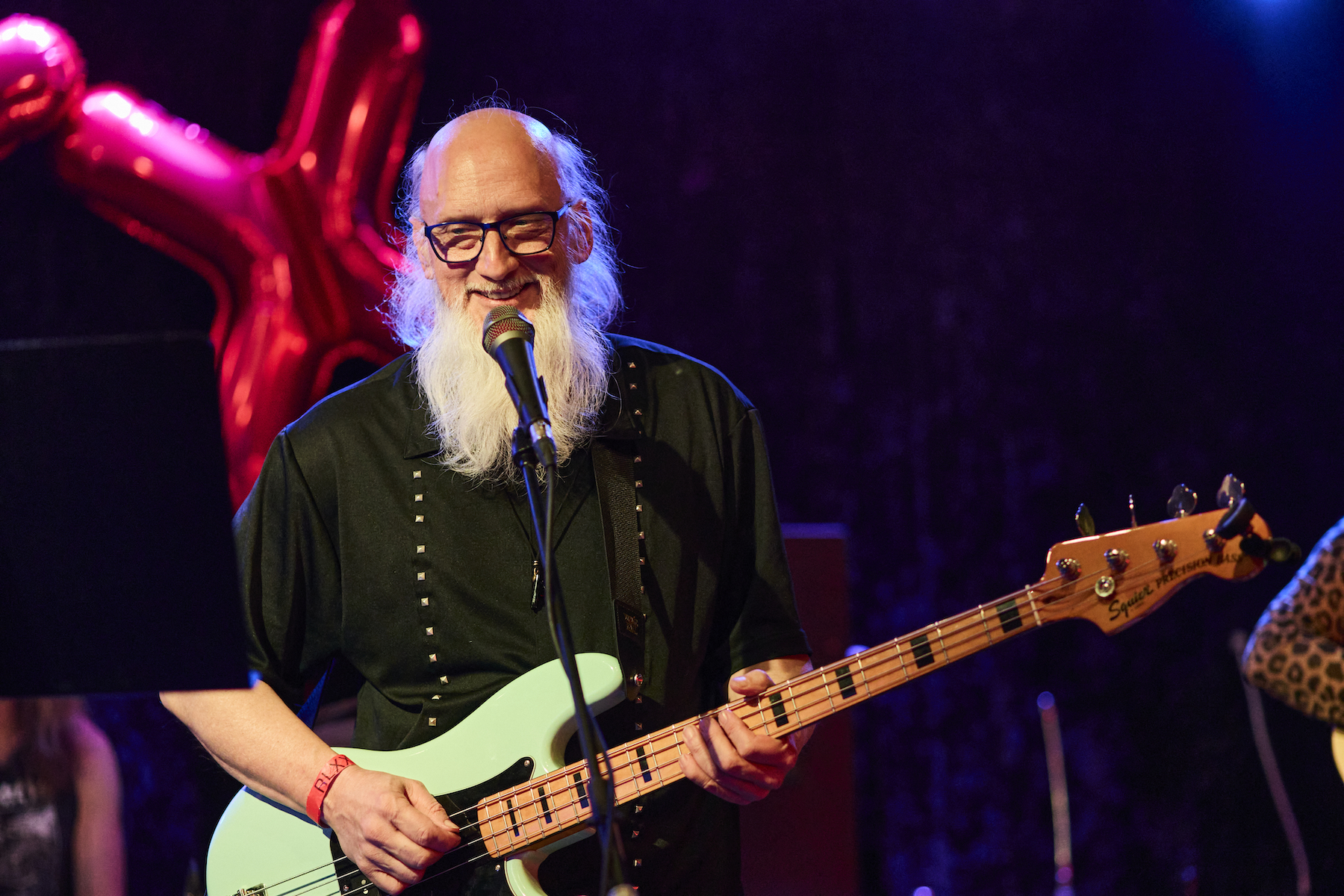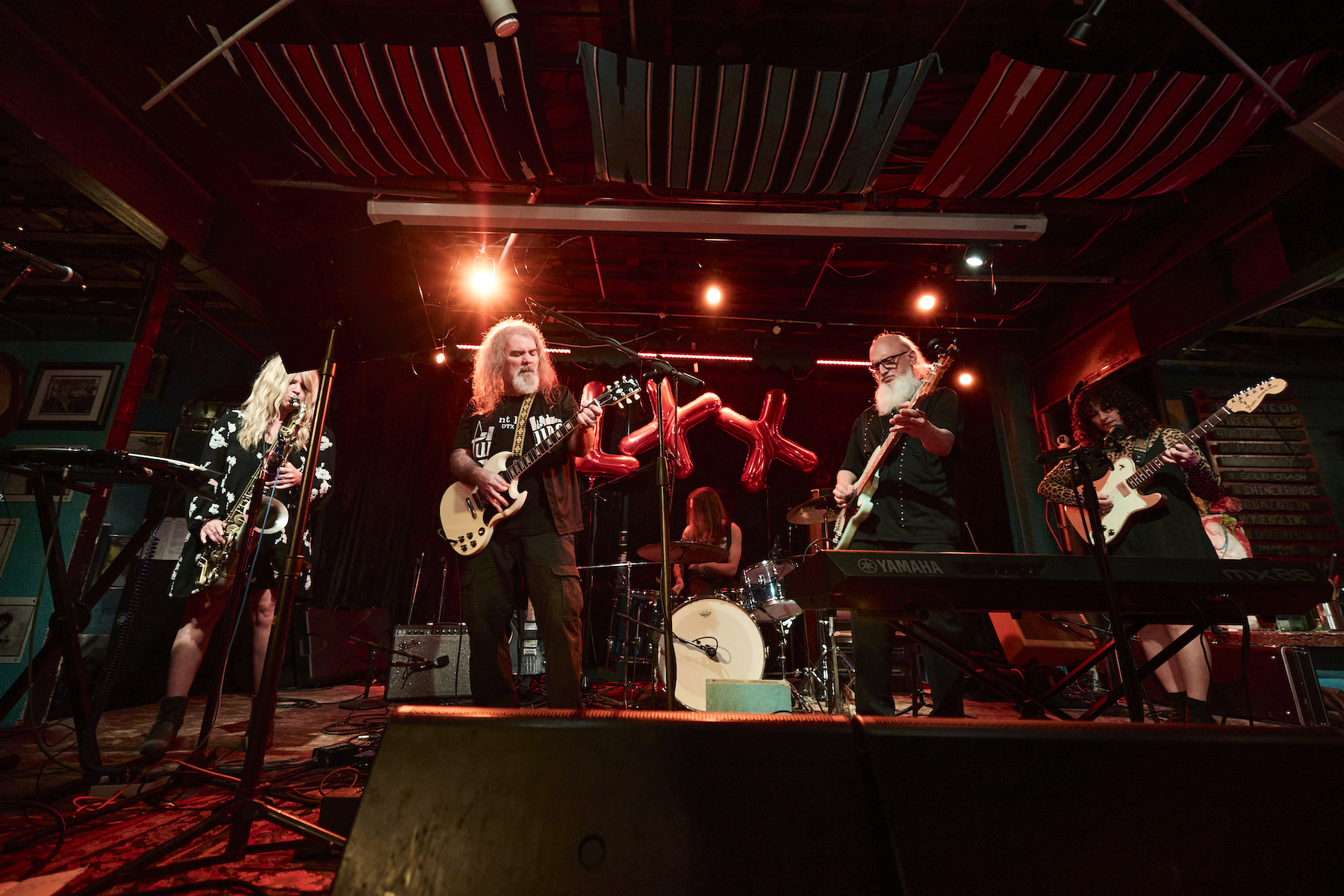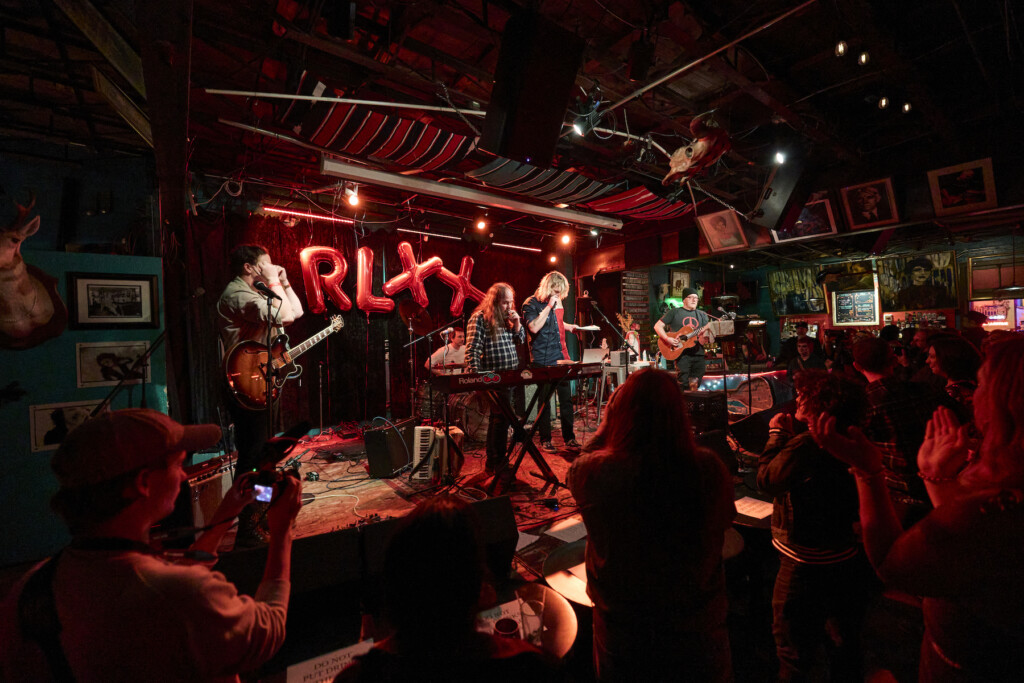The closest thing to a local music holiday is Rock Lottery, the occasionally annual benefit event that celebrated its 20th iteration in Denton this weekend. It sold out in days. An art collective known as Good/Bad developed the concept under the direction of Martin Iles and Chris Weber in the 1990s. It’s sometimes compared to Christmas, but it’s probably closer to Thanksgiving.
A warmly sentimental check-in with familiar faces acts as a reflection of scenes current and past. Twenty-five musicians drew names out of a hat found themselves in a brand new band for a day. There are plenty of puns and bad jokes. There is also home-cooked food. This year’s edition included members of Baptist Generals, Midlake, Pearl Earl, and other acts that more casual North Texas music fans may recognize.
Rock Lottery started in 1997 at the long-gone Argo near Fry Street. Musician and 91.7 KXT radio personality Paul Slavens was there, just as he was on Saturday night. (His band was Sphinctus.) He originally made his name in foundational local club act Ten Hands during the Reagan years. The group is about to release its first vinyl record.
“I was in the very first one,” Slavens said. “It was at the … in Denton, right by The Corkscrew. The Argo.” The beer store he is using to identify the club is gone now, too.

“Long-ass time ago,” Slavens said. “I was in a band with Will Johnson and it was fun. We were Magic Johnson: The Gathering. I don’t remember much about it except just showing up, doing it, having a blast. It was great; it was fun, you know?”
The event moved away from Fry Street long ago, established now at Dan’s Silverleaf on Industrial. It has evolved beyond the 1990s origins, a strange time where even star quarterbacks yearned to be Kurt Cobain. Today’s Rock Lottery is more inclusive.
“It was very White and male the first 10 years,” says co-founder Martin Iles. He attributes the changes to strategic tinkering in terms of committee and who was on them, including former D Magazine writer and photographer, Andi Harman. “Then Andi was there and it went the right direction,” Iles said. “She brought it, man. She brought it so hard. Fantastic BS radar. Doesn’t deal with BS at all. I miss her being involved.”
Iles dreams of a show with international instruments that crosses language barriers. The nature of the event already presents extensive challenges. Benefit shows are not paid performances, nor should they be. Not all name-brand artists or microcelebrities necessarily want to be involved.
“We’ve had years where very well-meaning people within the committees contact managers to get people on board,” Iles said. “I have to remind them, imagine being a tour manager, having to explain this event to your artist, how it’s charity and how there’s a potential for massive embarrassment and failure … There have been no-shows and bands have been named to humiliate the no-shows. There have been disasters and meltdowns on stage.”
The Rock Lottery audience tends to be the most forgiving a band will ever meet, however.
“You can’t have a more supportive audience,” Iles said. “They’re all standing out there thinking—I would never do this. You can go out there and just bomb but people are still going to applaud for you, they’re still going to be happy for you, they’re still going to be supportive and that’s what’s so sweet about it.”
This year’s Rock Lottery had a much more reunion-like quality to it than years past, which often acts as a snapshot of the North Texas music scene at any given time. In addition to scene veterans who have established roots here—Slavens, Brent Best, and Chris Flemmons—there are musicians who have found work elsewhere.
Nikki D’Agostino was a native of Easton, Pennsylvania before she moved to Denton as a music major. She performed in Rock Lottery 5, in 2003. She currently performs in New York with the projects Female Genius, Savini Psoas, and the Art Gray Noizz Quintet.
“It was really exciting,” D’Agostino said. “During the time the scene was small enough that we all kind of knew each other. It was exciting to be in a band with people you knew were very talented that you hadn’t gotten a chance to play with.”
D’Agostino represents the aggressively experimental side of Rock Lottery, which can be in stark contrast to the rustic songwriter side of music, an ancient divide. The music scene itself was more welcoming than the academic side of music at UNT for D’Agonstino, where the jazz department can be a bit more traditionalist in terms of playing a saxophone.

“I hadn’t really been playing out a whole lot at that point,” D’Agostino said. “There were nerves and 20 years on, that’s not a thing anymore. It’s nice to remember it being that kind of excitement. Something that you only have when you’re very young. I was playing in a band called Silver Arrows. And a Cobra ensemble.”
Cobra is something of an unconnected but spiritual predecessor to the Rock Lottery format; a card game composition that directs musicians in a series of improvisations on a shared stage. Iles specifically credits a one-day video festival created by a Good/Bad Collective associate named Dave Austin in 1994 for inspiring the idea.
“From everything I’ve read and tried to find no one had done this before and he (Austin) did it in Denton in 1994 with Good/Bad and that is the direct core inspiration for Rock Lottery,” Iles said.
The secret safety net for Rock Lottery bands, as with all bands, is the drummer. Musician Ed Priesner was summoned when a drummer dropped out of the festival in 2016. As part of the now mythical house venue known as Fra House, Priesner is a lifer, still performing in black metal and dramatic indie rock groups for decades.
He currently preforms in four different acts: Vanum, Morbid Sphere, Vilkacis, and Ends. He is a former member of Neon Indian, Last Men, and Fra Pandolf, where the Fra House took its name. The Fra House once made it all the way to the New York Times, in the hype-forward days of 2008. It was the American Apparel era roaring along, just prior to the financial collapse later that year.
Priesner found the Rock Lottery concept “entertaining” shortly after moving to Denton, but didn’t actually attend. Wanting to participate, he says he found it to be a “cool kids” sort of thing.
“I don’t think I ever actually went,” Priesner said. “Honestly when I lived there I was very poor and never ultimately prioritized it.”
His house venue may have been in the paper of record, but he couldn’t afford the cover at the local club. This anecdote contains the necessary origins of DIY itself.
As a benefit show, Rock Lottery has had a number of worthy causes since its inception, including the Denton County African American Museum and Parkland Hospital’s financial assistance program. This year’s recipient was the Denton Music and Arts Collective, which funnels much-needed healthcare to musicians. The entity has also had a close relationship with Denton’s self-funded, low-power FM radio station, KUZU. Sashenka Lopez is a vice chair of the station, as well as program director and a variety of other essential roles in the small operation.
“On the backend, Rock Lottery kept us alive and on the air for several years in a row, for several quarters,” Lopez says. “It was something that we could hope to be able to count on in the beginning years, because there were years when we might have ‘profited’ $100 in the whole year. We had just been holding it together.”
A dynamic and spotlight-thieving performer, Lopez played in the band, Christian! Teenage Runaway in the mid-aughts. She has a long-running solo project called Baka that has pushed her to rethink her approach to the stage lately. She was much more collaborative 10 years ago.
“Rock Lottery kept us alive and on the air for several years in a row, for several quarters.”
Sashenka Lopez, vice chair of independent radio station KUZU
“The last time I played I was used to getting on stage with multiple people,” Lopez said. “I was used to swapping instruments, and I was used to being pretty playful with my place and my role onstage. Since then I’ve been a solo performing artist and everything is very internal.”
Her percussion base for the day was the Dallas Cowboys drum line, a genius bit of programming on the part of the organizers.
“I think that is one of the heavy-hitting memories,” Lopez says. “The drummers that I got actually never had any experience being in a band where we came up with our own conceptual vibe, our own idea of what we wanted our sound to be in less than eight hours. That was really fun and challenging because I felt like their minds were blown.”
Lopez says some of the musicians in her band that day still keep in touch.
In a North Texas that is increasingly mired in buttoned-up commercial pragmatism, the endurance of Rock Lottery is cause for celebration. This was not always a foregone conclusion, even for myself. Writing about Rock Lottery 10 for the late blog We Shot JR, I made reference to no longer labeling the event a “self-congratulatory free-for-all.” That year’s event had artist Ashley Leer as a performer, who is known for playing in the groups Record Hop, Def Rain, and Abbreviations. These acts all share general good will and approval from local crowds and the media. Talking to Leer by phone, she remembers her more humble origins in local music.
“I was in an all-girl band called Stick Shift,” Leer said. “It was me and these two other girls. I had never played with anyone ever, so it was the first time I had just gotten used to writing with other people. I recently just heard a tape of that that we recorded. It made me happy because it didn’t embarrass me. That’s not bad, but at the same time I had zero lyrics and I was making up words with no shame. Looking back on it, I’m thinking, ‘what the hell was wrong with me?’ I couldn’t put any words to this. Any word would have done and I was like—Nope, I want something that sounds like a word but isn’t.”
Leer is often the adult in the practice space, however indecipherable her words may be. She adds poise to any project she’s in, even if it’s something as simple as making sure the guitars are always in tune. That’s a highly underrated concept in noise rock. She doesn’t afford herself the same credit.
“I feel like I’m ill-equipped knowledge-wise, when it comes to playing with Paul Slavens and people like that,” Leer says of the aforementioned pianist, who is known for his scoring and composition abilities.
“I have some friends who are like—That thing again. Are they still doing that?,” Leer said when she tells people she’s playing Rock Lottery again. Her impression of her friends is not flattering.
Leer was glad to be back for a third time; her band’s name was Live, Laugh, Love.
“I think it’s really incredible to be asked to do it for a third time,” Leer said. “It makes me feel good. It makes me feel like—Ah, cool. I didn’t piss a bunch of people off.” I guess I didn’t suck too bad the first two times that they want me to come back. It feels good to be wanted I guess, on some very plain level. I am looking forward to it.”
Author







